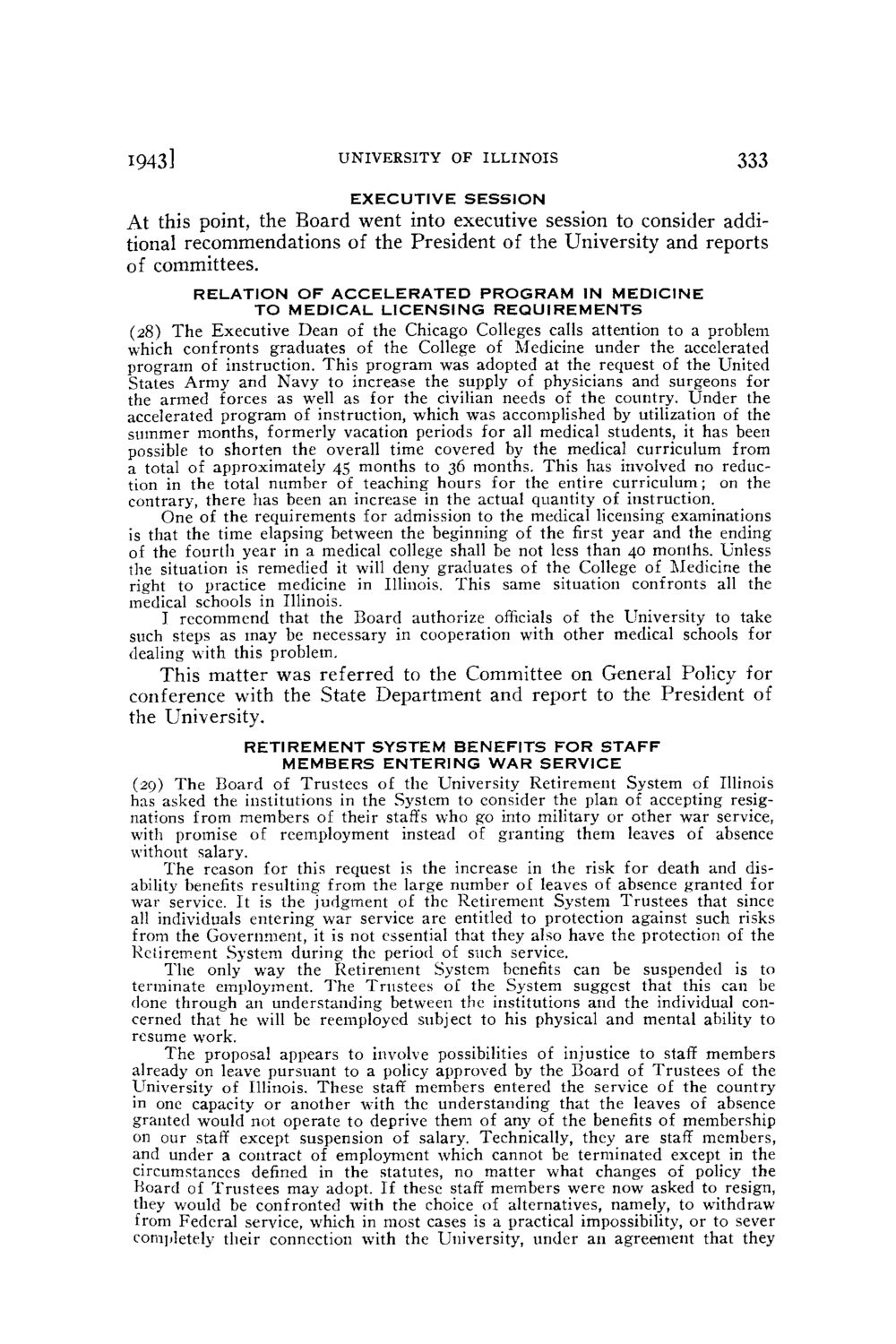| |
| |
Caption: Board of Trustees Minutes - 1944
This is a reduced-resolution page image for fast online browsing.

EXTRACTED TEXT FROM PAGE:
1943] U N I V E R S I T Y OF I L L I N O I S 333 EXECUTIVE SESSION At this point, the Board went into executive session to consider additional recommendations of the President of the University and reports of committees. RELATION OF ACCELERATED PROGRAM IN MEDICINE TO MEDICAL LICENSING REQUIREMENTS (28) T h e Executive Dean of the Chicago Colleges calls attention to a problem which confronts graduates of the College of Medicine under the accelerated program of instruction. This program was adopted at the request of the United States Army and Navy to increase the supply of physicians and surgeons for the armed forces as well as for the civilian needs of the country. Under the accelerated program of instruction, which was accomplished by utilization of the summer months, formerly vacation periods for all medical students, it has been possible to shorten the overall time covered by the medical curriculum from a total of approximately 45 months to 36 months. This has involved no reduction in the total number of teaching hours for the entire curriculum; on the contrary, there has been an increase in the actual quantity of instruction. One of the requirements for admission to the medical licensing examinations is that the time elapsing between the beginning of the first year and the ending of the fourth year in a medical college shall be not less than 40 months. Unless the situation is remedied it will deny graduates of the College of Medicine the right to practice medicine in Illinois. This same situation confronts all the medical schools in Illinois. I recommend that the Board authorize officials of the University to take such steps as may be necessary in cooperation with other medical schools for dealing with this problem. This matter was referred to the Committee on General Policy for conference with the State Department and report to the President of the University. RETIREMENT SYSTEM BENEFITS FOR STAFF MEMBERS ENTERING WAR SERVICE (20) The Board of Trustees of the University Retirement System of Illinois has asked the institutions in the System to consider the plan of accepting resignations from members of their staffs who go into military or other war service, with promise of reemployment instead of granting them leaves of absence without salary. The reason for this request is the increase in the risk for death and disability benefits resulting from the large number of leaves of absence granted for war service. It is the judgment of the Retirement System Trustees that since all individuals entering war service are entitled to protection against such risks from the Government, it is not essential that they also have the protection of the Retirement System during the period of such service. The only way the Retirement System benefits can be suspended is to terminate employment. The Trustees of the System suggest that this can be done through an understanding between the institutions and the individual concerned that he will be reemployed subject to his physical and mental ability to resume work. The proposal appears to involve possibilities of injustice to staff members already on leave pursuant to a policy approved by the Board of Trustees of the University of Illinois. These staff members entered the service of the country in one capacity or another with the understanding that the leaves of absence granted would not operate to deprive them of any of the benefits of membership on our staff except suspension of salary. Technically, they are staff members, and under a contract of employment which cannot be terminated except in the circumstances defined in the statutes, no matter what changes of policy the Board of Trustees may adopt. If these staff members were now asked to resign, they would be confronted with the choice of alternatives, namely, to withdraw from Federal service, which in most cases is a practical impossibility, or to sever completely their connection with the University, under an agreement that they
| |